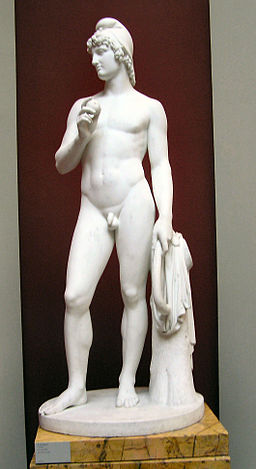 |
| Paris (from wiki commons) |
And so Theseus rightly felt love’s flame, for he was acquaint with all your charms, and you seemed fit spoil for the great hero to steal away, [...] His stealing you away, I commend; my marvel is that he ever gave you back. So fine a spoil should have been kept with constancy. Sooner would this head have left my bloody neck that you have been dragged from marriage-chamber of mine. One like you, would ever these hands of mine be willing to let go? One like you, would I, alive, allow to leave my embrace? If you must needs have been rendered up, I should first at least have taken some pledge from you; my love for you would not have been wholly for naught. Either your virgin flower I should have plucked, or taken what could be stolen without hurt to your virgin state.
So Paris writes to Helen
in the Heroides, by Ovid.
But here's the thing about Paris. Pop-culture always tries to make him into some kind of coward, probably because he steals another man's wife, certainly because of the passage in The Iliad where he challenges Menelaus and then Aphrodite whisks him off before he can see it through to the finish, and Helen herself expresses disgust for his heroic character, or lackthereof, and those readers who are paying attention will point out in their arguments that Paris' weapon of choice is the bow and arrow, the "weapon of cowards."
The truth is, though, that Paris doesn't do anything other heroes haven't done. Maybe Paris isn't a Theseus, but Ovid certainly shows us an Odysseus-like schemer. charismatic and brilliant, charming and wily. And it makes sense -- it takes an incredible amount of self-confidence and cunning to
show up as a guest in another man's house and devise a plan to seduce said man's wife
underneath the nose of his host with the sole purpose of stealing her. It takes nerve to challenge that man
later on the field of battle, knowing his reputation as a warrior. And
as for the bow and arrow, Heracles was known for employing one, too, and
I don't know anyone who would consider him a coward.
What gets Paris into trouble is only the context of his actions. There's
the oath of Helen's suitors, of course, where they all have sworn to
protect Menelaus' possession of Helen, but even so, Paris' greatest and
only real sin is breaking Xenia: the sacred laws of hospitality.
In the Heroides, Paris says:
My passion for you I have brought; I did not find it here. It is that which was the cause of so long a voyage, for neither gloomy storm has driven me hither, nor a wandering course; [...] It is you I come for – you, whom golden Venus has promised for my bed; you were my heart’s desire before you were known to me. I beheld your features with my soul ere I saw them with my eyes; rumour, that told me of you, was the first to deal my wound.
And then, later:
And do not fear lest, if you are stolen away, fierce wars will follow after us, and mighty Greece will rouse her strength. Of so many who have been taken away before, tell me, has any one ever been sought back by arms? Believe me, that fear of yours is vain. In the name of Aquilo the Thracians took captive Erechtheus’ child, and the Bistonian shore was safe from war; Pegasaean Jason in his new craft carried away the Phasian maid, and the land of Thessaly was never harmed by Colchian band. Theseus, too, he who stole you, stole Minos’ daughter; yet Minos called the Cretans ne’er to arms. The terror in things like these is wont to be greater than the danger itself, and where ‘tis our humour to fear, we shame to have feared too much.
Had Paris arrived in Sparta with a raiding party and made off with Helen in the night, it would have been just another day in the bronze age -- but because he stole her away AFTER he had accepted guest-friendship with Menelaus (falsely, I might add, because he knew why he was there from the start!), he had committed a grave, grave sin which would, without question, incite the wrath of the gods. In fact, if Paris had stolen her away in a raid, it's possible that the oath wouldn't have been enough to bind the suitors to his cause at all. Paris is an outside party, and the fact that Menelaus would not have been able to defend what was rightfully his in battle, his own wife and kingdom, no less, would almost certainly have shamed him, even if he'd known exactly who had taken Helen and where to wage a war to get her back, which would probably have been less likely in a raid-scenario.
The fact of the matter is, stealing Helen wasn't Paris' greatest crime, and it certainly wasn't the act which ruined his reputation. And Paris? He wasn't a coward. He just thought that because Aphrodite had given him the nod, he was within his rights to ignore sacred law to take what he believed was rightfully his.
That just sounds like regular old Hubris to me.
Same old, same old.

In that din [the centaur] Aphidas lay with every vein relaxed in endless sleep, unwoken, undisturbed, sprawled on a shaggy bearskin from Mount Ossa, his wine-filled cup in his unconscious hand, out of the fight--in vain! Observing him lying apart there, Phorbas fingered firm his lance's thong : ‘You'd better mix,’ he cried ‘your wine with Styx's water!’ There and then he hurled his lance and through Aphidas' neck, as he lay sprawled face-up, the iron-tipped ash drove deep. Death came unfelt. Over the couch--into the cup--blood gushed from his full throat. (Metamorphoses, 12.316)










